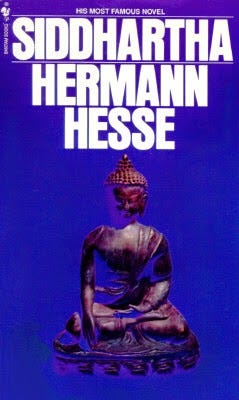Book Review—Siddhartha by Herman Hesse
A comfort book
The body was certainly not the Self, nor the play of senses, nor thought, nor understanding, nor acquired wisdom or art with which to draw conclusions and from already existing thoughts to spin new thoughts.
No, this world of thought was still on this side, and it led to no goal when one destroyed the senses of the incidental self but fed it with thoughts and erudition.
Both thought and the senses were fine things, behind both of them lay hidden the last meaning; it was worth listening to them both, neither to despise nor overrate either of them, but to listen intently to both voices.
Herman Hesse, Siddhartha
These were the lines that impressed me very much in this book. It epitomises the intent of the book and the kind of content it carries. It is a book that discusses philosophy without making it too didactic. However, it does not reduce the content to a commonplace narrative.
There are several aspects of the book that make it a great read. For starters it is not too lengthy. I might sound a bit lazy here, but very lengthy books with shades of philosophy are a big turn off.
In addition to that , the story here is very straightforward. The number of characters are less, however each of them are crafted well. And they serve their roles well.
The cover page and the title of this book could mislead a lot of people, including those who consciously decide not to judge books by their cover pages. Siddhartha is not a book about Buddha, though he appears as a character in one of the chapters.
Siddhartha is a character by himself, an individual who is seeking out for truth, like many learned wanderers of his time. However, his path is unconventional. It is not an exercise to escape from the mainstream. It is not a conscious effort to shun emotions and human relationships.
The story begins with the academically accomplished youth Siddhartha going to his father and seeking for permission to leave the house and join a group of ascetics called Samanas (literal Sanskrit translation – equals). His father objects in the beginning, but later gives in to Siddhartha’s determination.
Siddhartha is joined by his friend Govinda. Govinda is literally a sidekick. He always shadows Siddhartha and his endeavours. The writer, Herman Hesse, might have created to make him ask questions that a normal reader would want to ask. Every protagonist needs a sidekick.
After spending time with Samanas, the duo face a stagnation. They hear about Gotama Buddha, the learned one. They separate from Samanas and go to listen to Buddha’s sermons.
After his sermon, Siddhartha questions Buddha’s teachings and says that his doctrine had loopholes. Here, Govinda , for the first time disagrees and becomes a disciple of Buddha. The story moves on, and their paths diverge.
Siddhartha continues his journey. He meets a ferryman, a courtesan, a trader and then again Govinda in the end. He explores the world of renunciation (Nirvana) and emotions (Samsara) [both are rough and inaccurate translations].
The story ends in their final encounter and a conversation that dwells on the summary of Siddhartha’s journeys and lessons learnt from the people he has met in his life. Finally, Siddhartha says :
Everything that is expressed in words is one-sided, only half the truth; it lacks totality, completeness, unity. When the Illustrious one taught about the world, he had to divide it into Samsara and Nirvana, into illusion and truth, into suffering and salvation.
One cannot do otherwise; there is no other method for those who teach. But the world itself being in and around us, is never one-sided.
Never is a man or a deed wholly Samsara or Nirvana; never is a man wholly a saint or a sinner. This only seems so because we suffer the illusion that time is something real. Time is not real, Govinda.
I have realised this repeatedly,. And if time is not real, then the dividing line that seems to lie between this world and eternity, between suffering and bliss, between good and evil is also an illusion.
Herman Hesse, Siddhartha
On the surface, this sounds abstract. But it does poke into issues that we still haven’t resolved. We have still not proved what is time? We don’t know what happened before big bang or 13.6 billion years.
However, the whole paragraph would sound like bullshit when we talk in the context of Boko Haram or ISIS and their barbaric methods. It would sound like absolute bullshit when we speak of malnourished African kids or extreme poverty.
But then, there isn’t any answer to all this mess. Or maybe there is. Somebody will have to bomb ISIS, tax the middle class and feed the poor or whatever the text book solutions may say.
Would these solutions resolve all violence and suffering for good? History says , that it hasn’t. Evil didn’t die with the end of Hitler or Stalin. It has reappeared again and again in various forms. It will continue to do so.
And no one knows why or why not. The truth is, we are here for a very short period of time and we have created so much of mess and a pile of unanswerable questions. And individuals will never be able to resolve them in one lifetime.
Our problems are too complex to be answered with one abstract paragraph or an enlightened Buddha/Siddhartha.


